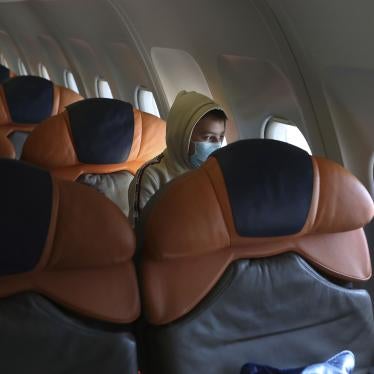Many people in Lebanon reacted with outrage after YouTube footage surfaced in March showing a man in an office beating three children on the soles of their feet with a wooden stick. Media outlets later identified the man as Moussa Daher, principal of the Makassed School in the village of Daiat al-Arab in southern Lebanon. In the video, Moussa is heard saying to one of the children, “Every time you put your feet down I will beat you more.” The children are crying and pleading for him to stop.
Media reports said that Moussa was punishing the students for failing their exams. While the head of the Makassed School Association condemned Moussa’s violence, he justified the acts as “momentarily losing control” and said that, “the parents asked the principal to be harsh with their children.” Education Minister Elias Bou Saab dismissed the principal, but the parents of the children who were beaten defended Moussa’s actions, and a member of the parent’s committee at the school called on the minister to revoke his decision.
A 2012 study by Saint Joseph University found that nearly half of Lebanese students surveyed had experienced disciplinary violence at school. The study called on authorities to respect Article 19 of the United Nations’ Convention on the Rights of the Child, which Lebanon ratified in 1991, by taking “all appropriate legislative, administrative, social and educational measures to protect the child from all forms of physical or mental violence.”
Lebanon’s penal code, and specifically Article 186, has long permitted corporal punishment of children in schools and homes. The education minister rejected violence in the name of discipline in a memorandum issued to all public schools in 2001. While some private schools introduced anti-corporal punishment regulations in response, others did not.
On April 9, parliament voted to revoke article 186, but a day later, following complaints by religious figures, Parliament adopted an amended version of the article to criminalize corporal punishment at school but allow “non-violent disciplinary” acts at home so long as they do not lead to physical or psychological harm. The article does not, however, clearly define “non-violent disciplinary” measures or “physical or psychological harm”.
In a radio interview, Mohamad Hajar, a member of parliament who voted against revoking Article 186, argued that the article in its amended form protects family unity. “It does not make sense that every time a parent slaps his child on his hand the child would file a complaint,” he said.
While the amendment to Article 186 is an important step toward protecting children from corporal punishment in schools, it fails to provide children with adequate protection from violence in the home. Conditioning a child’s protection from violence on family status apparently would mean that Lebanon will still be in violation of the Convention on the Rights of the Child. That international treaty requires Lebanon to “ensure that the child is protected against all forms of discrimination or punishment on the basis of the status, activities, expressed opinions, or beliefs of the child’s parents, legal guardians, or family members.”
Repealing the article would bring the penal code in compliance with Law 422 for the Protection of Juvenile Delinquents and Endangered Juveniles, adopted in June 2002, which protects children from violence and mistreatment. Bassma Roumani, a lawyer working for anti-child abuse campaigners Himaya, said that the organization will continue its work toward repealing Article 186 and ensuring that children are fully protected under the law.
In a society where violence remains socially acceptable, members of Parliament need to send a clear message that all forms of violence against children will not be tolerated. The best way to do that is to repeal Article 186 outright.
Diana Semaan is a research assistant at Human Rights Watch in Beirut






